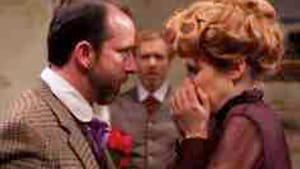Stay in the Loop
BSR publishes on a weekly schedule, with an email newsletter every Wednesday and Thursday morning. There’s no paywall, and subscribing is always free.
Empty lives, up very close and personal
Lantern Theater's "Uncle Vanya' (1st review)

Chekhov’s tragicomical Uncle Vanya follows the unhappy, wasted lives of people who have come together in midsummer for what Sondheim might have called an extended “weekend in the country.” All of them are either bored or miserable or both. They’re as angry as Tea Party adherents, with one important difference: The Tea Partyers, at least, took action to address their resentments.
Sonya and her Uncle Vanya have toiled for years to keep the family estate financially afloat while Vanya’s mother sits in disapproving judgment of her son and in admiration for the professor, who is Sonya’s father with his first wife, Vera, from whom he inherited the estate after her death. Lantern Theater’s production of Chekhov’s classic is unusually intimate. The audience’s chairs encroach on the playing area, so those of us on the front row need to pull in our legs to avoid tripping the actors. And the stage set is not nearly as deep as in other Lantern productions. Furniture and props are sparse. Everything and everyone seems close.
This physical intimacy leads to a performance of quiet intensity. Accordingly, more focus than usual shines on the understated characters, such as Vanya’s niece, Sonya, and her stepmother, Yelena, as well as the near-silent Vanya’s mother. The actresses in these roles rise to the occasion.
Slavic bearing
Yelena enters the play in elegant silence, and the hard-working Sonya never calls attention to herself, so it’s exhilarating to see the two parts brought to life by Sarah Sanford and Melissa Lynch. The adorable Lynch impresses with the way she embodies the unattractive Sonya, while Sanford captures a wonderful helping of Slavic aristocratic bearing. (It’s no accident that the name Yelena is the Russian equivalent of Helen, as in Helen of Troy. Hers is the face that launches the desires of three men.)
The women seem rivals at the start, and Yelena delivers a cruel compliment to Sonya: "You have beautiful hair." But they subsequently bond with an empathy that’s unique among all the assembled characters.
Chekhov’s alter ego
Chekhov’s script usually shines more spotlight on the title character and the visiting doctor, Astrov. The latter seems a visionary spokesperson for environmental issues, and he also claims our interest as a stand-in for the playwright, himself a physician. This staging by Kathryn MacMillan offers a different interpretation.
For one thing, Astrov here seems unusually hollow. He is obsessed with the environment to the exclusion of human feelings. We hear more concern for deer and wood doves than we do for the health of his patients. When trying to seduce Yelena, he talks to her about conservation of nature’s resources until he finally realizes she has no interest in the subject.
Chekhov, it seems, wasn’t totally in Astrov’s corner. His writing exaggerated Astrov’s single-mindedness for comic effect, because Chekhov wanted his play to focus more on humor than on drama. Charlie DelMarcelle, as Astrov, played his part straight and missed some opportunities to highlight the ridiculous nature of his obsession.
Failure at everything
Peter DeLaurier as Vanya presented an often-hilarious misanthrope who delights in telling everyone that he finds no delight in life. He is a failure at everything: He cannot win Yelena’s love, nor can he commit suicide, nor can he succeed when he tries to kill Yelena’s pompous husband, Professor Serebriakov. Eventually Vanya returns to his life’s mission of administering the estate. He hates the job, but it’s the only activity in which he finds comfort. DeLaurier encapsulates Vanya’s attempts to break out of the family’s ennui until he, in the end, subsides into a continuation of it.
The egotistical and demanding professor was magnificently portrayed by David Howey. Although his success in his profession has been limited, he stands as a contrasting touchstone– he, among all the rest, at least has had some visible accomplishments. The smaller roles are also fine. Ann Gundersheimer is appealing as the tea-pouring nanny. David Blatt is endearing as an impoverished landowner who works on the estate. Ceal Phelan is Vanya’s stony and stolid mother.
The stage setting is intimate, with plain chairs and tables and only a samovar and glasses on the shelves. The rest of the cupboard is as bare as the characters’ lives.♦
To read another review by Robert Zaller, click here.
To read another review by Jane Biberman, click here.
What, When, Where
Sign up for our newsletter
All of the week's new articles, all in one place. Sign up for the free weekly BSR newsletters, and don't miss a conversation.
 Steve Cohen
Steve Cohen